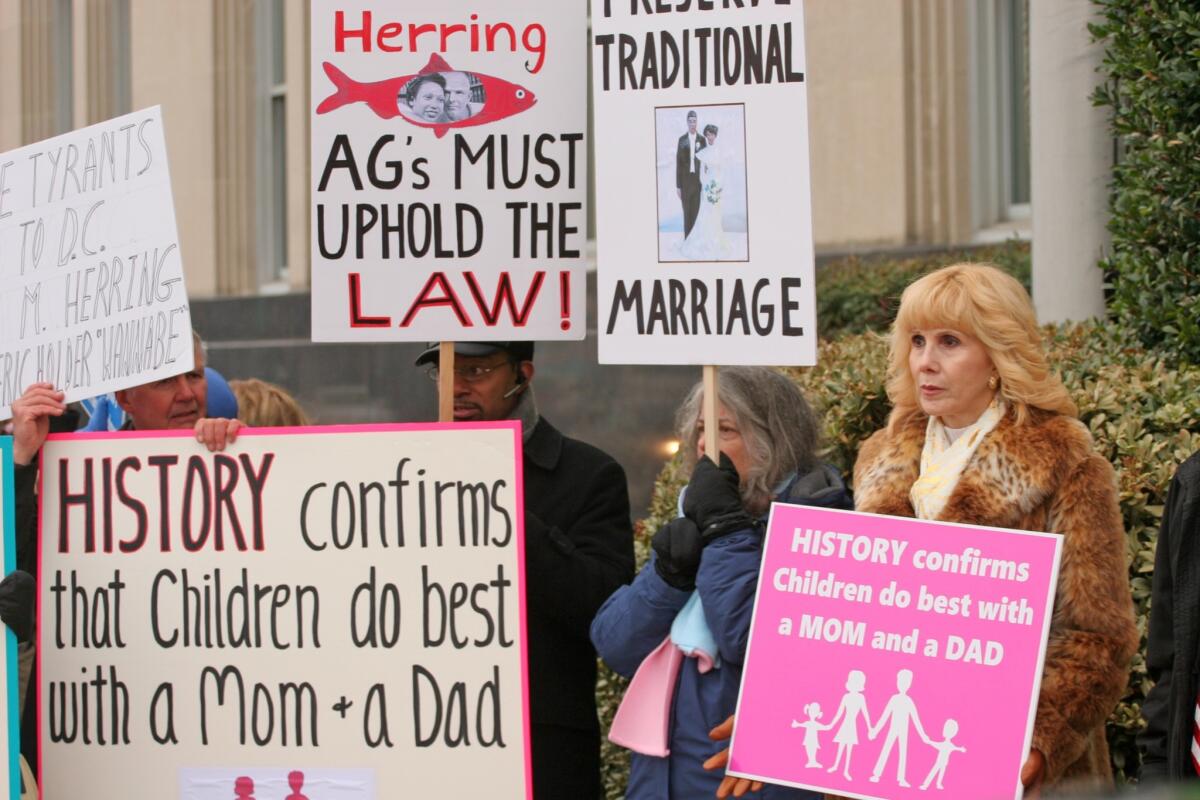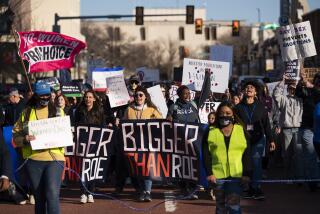Gay-marriage battle unfolds in Virginia, Utah courts

- Share via
Utah has filed its opening salvo defending its ban on gay marriage, while in Virginia, a federal judge will hear arguments about that state’s similar law in the latest legal maneuvering over the right for same-sex couples to marry.
The separate legal actions are part of the growing number of court battles over what remains a sensitive issue since the U.S. Supreme Court struck down parts of the federal Defense of Marriage Act in June. That ruling, hailed as a major step by gay-marriage advocates, gave federal recognition to legally married gay couples and extended to them the same federal health, tax, Social Security and other benefits that heterosexual couples receive.
But the top court’s ruling was limited and stopped short of a more sweeping decision that same-sex couples had a constitutional right to marry. That has opened the door to lawsuits in about a dozen states over extending marriage to same-sex couples.
Two of the key battlegrounds have been in Utah, a conservative state that is strongly Mormon, a religion that opposes same-sex marriage on religious and other grounds. Virginia also has a conservative reputation, though it has recently elected Democrats to top spots in the last cycle. If the ban on same-sex marriage is toppled there, it would be the first state from the old Confederacy, generally conservative and religious, to allow same-sex marriage.
Currently 17 states and the District of Columbia allow gay marriage. Most are clustered in the Northeast, but the group also includes Illinois and California.
Utah was poised to become the 18th state when U.S. District Court Judge Robert J. Shelby overturned Utah’s ban on same-sex marriage. He ruled that there was a constitutional right to such marriages. The state objected, and about 1,000 gay couples married before the U.S. Supreme Court granted a stay of Shelby’s decision, pending an appeal.
Late Monday night, Utah filed its opening argument with the Denver-based 10th Circuit Court of Appeals. It argued that Shelby had erred by not giving enough weight to the Supreme Court’s decision that states had a right to define marriage, and Utah contended that the federal government cannot interfere with its decision-making authority.
Utah’s arguments call for a permitted “diversity of outcomes” rather than a “uniform national answer” on marriage practices, the 120-page brief says.
Limiting marriage to one man and one woman fulfills “a compelling governmental interest” rooted in tradition and religion, the state said, using some of the same arguments it had during the earlier stages of the case. It also stressed the importance of the ban in promoting its interpretation of child welfare. The ban is supported by approximately 20 of the 25 largest faith communities in Utah that “understand marriage and sexuality as gifts from God” and primarily designed to bear and raise children, the state maintained.
“These beliefs are tied not only to theology but also to religious and family practices, deeply and sincerely held personal beliefs, and entire ways of life,” the state said. “They are not less integral to the dignity and identities of millions of Utah citizens than plaintiffs’ sexual orientation is to them,” the state argued.
Attorneys for three same-sex couples challenging Utah’s ban are expected to reject all of the arguments when they formally respond by Feb. 25.
Oral arguments before a three-judge panel are scheduled for April 10.
In Virginia, newly elected Atty. Gen. Mark Herring, a Democrat, surprised many when he announced that he would not defend the state’s ban on same-sex marriage. Gov. Terry McAuliffe, also a recently elected Democrat, backed Herring.
The decision infuriated Republican lawmakers who passed a bill that would give legislators standing in lawsuits where the attorney general and the governor have chosen not to participate.
On Tuesday, a federal judge will hear a lawsuit brought by a Norfolk couple who were denied a marriage license. They argue that the state is denying them their rights under the Constitution to marry. The suit has been joined by a Virginia couple who were married in California in 2008 and have a daughter. They are seeking to have Virginia recognize their marriage.
Because Herring’s office is siding with the plaintiffs, the job of defending the law during verbal arguments will fall to the legal team of Norfolk’s Circuit Court clerk. In addition, an attorney for the religious group Alliance Defending Freedom will present arguments on behalf of the Prince William County’s clerk, which has been allowed to intervene in the case, as to why the law should be upheld.
ALSO:
It’s Groundhog Day: Here are 5 things to know
Cold stats: This winter explained in 12 chilling numbers
U.S. abortion rate in 2011 lowest since 1973, study says
More to Read
Sign up for Essential California
The most important California stories and recommendations in your inbox every morning.
You may occasionally receive promotional content from the Los Angeles Times.











